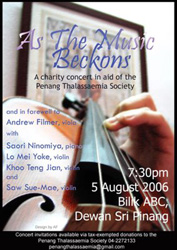I’ve got to get down to reading Why Bad Things Happen to Good People. But at the risk of judging a concept by its cover – or at least its choice of title – the point isn’t really about good or bad, but right and wrong.
Bad things happen to good people all the time, but most of the time it doesn’t exactly stop time. Nun steps on a nail. Animal lover gets bit by rabid dog. Occasionally ironic, and always unfortunate, but not something that will shake up your world now is it.
But then something happens which disrupts one’s concept of how things should be. Priests who take sexually assault altar boys. Sacrifice of morals in the name of patriotism. And how the people you trust sometimes end up hurting you the most. Sometimes I think that the context of right and wrong is not just a question of what would be good or bad, but a question of should, and that some things are meant to be in a “right” place in our world.
I’d be more upset having fifty dollars stolen or cheated off me than five hundred dollars stupidly lost at a casino. Which isn’t exactly logical, first from the perspective of how much I’d be losing, and that in the latter case I should feel even worse for quite consciously being an idiot. And yet the fifty weighs that much heavier not because you’re worried that you’d be the target of losing another fifty. It weighs that much simply because it was wrong to have that happen. It wasn’t quite right.
Something that’s bad may not always be wrong – like losing money on cards. Stupid, but not wrong. But something that’s less than worse, could be far more wrong than right.
I used to ask myself what kind of people read Why Bad Things Happen to Good People and self-importantly think that they’re good enough – better enough – not to have bad things happen to them. Nobody’s perfect. The essence of humanity is indeed that we do err, but the point is that to err is to underline that it is a mistake, and the definition of a mistake is the quality that underlies its intent. Yes, we do bad things sometimes – but did we know what we were getting into, when we did them? In some sense it’s about how bad it is we have acted, but perhaps the greater focus is towards whether we’ve done right or wrong. And how much we’ve not only worked toward an admission of responsibility, but true accountability by actions deserving of redemption.
If we’ve chosen to be mature and had a certain moral strength to try to do the right thing – because in the end maturity and strength are essentially about the choice of what we want to be and how much we’re willing to do – then we’ve also chosen to be good people even if we have unfortunately caused bad things to happen. And what defines us as good people is that we know what’s right and wrong and don’t try to rationalize it away. And it is in this sense that the world goes upside down not when bad things happen to good people, but wrong things happen to good people – because that worldview which defines us is also what can most affront us.
I think that perhaps good people are essentially optimists, and bad people are opportunists: both basically revolve around a perspective of life either as having a certain moral order for all, or whether it’s about getting whatever you can that defines the equation. Bad people don't always start bad - in many a sad case it's more about the compromises to ethics, the rationalization that they make along the way, and eventually they're swimming in a sea of grey. As life shows its realities good people end up being closet optimists, bulwarking with a certain cynicism, a certain brand of caution. They’re not pessimists who think that we’re all headed towards the pits, but ones who still value their hope that what they think is right and wrong will be what they see when they look out the window, while knowing that they still need a window, sometimes a bullet-proof one, to keep that hope alive.
Sadly, while it keeps at bay the danger, it makes it difficult to trust others, in trying times even brings doubt to the trust that we’ve already established. The very optimism that first allowed real connections to flourish can come back to shake our very foundations.
It is the price we pay to have a belief in a system of what’s right and what’s wrong. The price being that we have to have that belief placed in doubt. For each challenge to our faith serves to let us remind ourselves why we have actively chosen that faith. And that the choice is not one which we just sign on the dotted line on day one, but one we commit to with every day we spend on the path. In the end it really is not just the destination, and not even the sights and sounds of the journey, but the distance we cover, and the scars we hold as badges of honor.
It’s just not right sometimes.
But we go on nonetheless. And damaged and limping as we are at times, by not giving in, we have hopefully become as a people more “good” today, firmer in knowing that right and wrong takes blood, sweat and tears. And maybe, just maybe, that little effort in the face of wrong, helps to tilt the world a little bit back on its axis.
Monday, September 22, 2008
Subscribe to:
Post Comments (Atom)






No comments:
Post a Comment